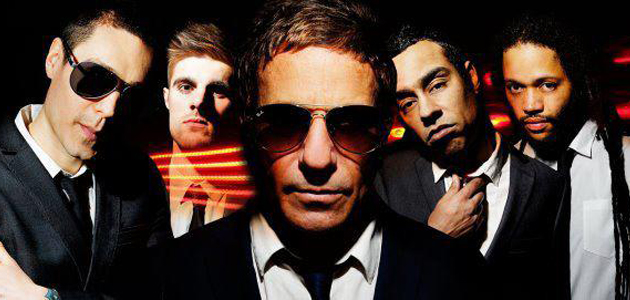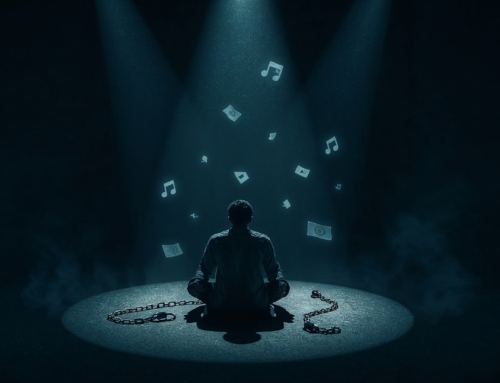
Musical party provocateur Barry Ashworth is well known as front-man for the Dub Pistols, a London band whose highly-danceable mash-up of dub, rock, electronica and hip-hop has taken them from the brink of multi-million dollar international success to the edge of destruction and back again.
Ashworth is also a sought after DJ who was one of the first residents at the influential club Fabric in London and has performed high-octane primetime sets internationally in such countries as Australia, Singapore, Dubai, Thailand and Germany. Additionally he’s is founder of Westway Records, a London breakbeat and hip-hop label that’s put out releases from many currently-emerging artists from the UK dance music underground.
Ashworth took time out from recording the Dub Pistols forthcoming album to speak with crossfadr’s Alex Baker about DJing, the record business, dubstep, and the high highs and low lows of spending fifteen years in the UK’s “most successfully unsuccessful band.”
crossfadr: What’s that new album called?
BA: Worshiping the Dollar. There’s a lyric, it’s like ‘Kids living in squalor/worshiping the dollar/but there is no flag that’s big enough to wrap around the horror.’ It’s anti-imperialism.
crossfadr: Where does your lyrical inspiration come from?
BA: I dunno mate, everything. I mean before when we used to do the early Dub Pistols stuff, when we had the second album Six Million Ways to Live, then we were kind of going more political. Then 9/11 happened and it really fucked our careers up. So we stayed away from politics for a while, but this album’s gone a bit back to politics with everything that’s going on in the world.
crossfadr: How did 9/11 screw up your career?
BA: Well because our album was coming out that week and we were signed to Geffen at the time, like a big billion dollar deal, and the lyrics on that were like ‘Submarine sinks fall from the sky/tallest buildings burn/oh how the mothers they cry,’ and ‘blowing up the White House like I was an alien in Independence Day, ‘ and it kind of looked like . . . do you know what I mean?
crossfadr: I could see how that could go badly, yeah.
BA: It was a game changer for us. I mean that was our album coming out that week and then after that it never came out in America at all. We spent two years trying to get our record back between not being able to make a record, because you can’t make a record when you got one that’s sitting ready go out. And after that we basically had to put our career back together again.
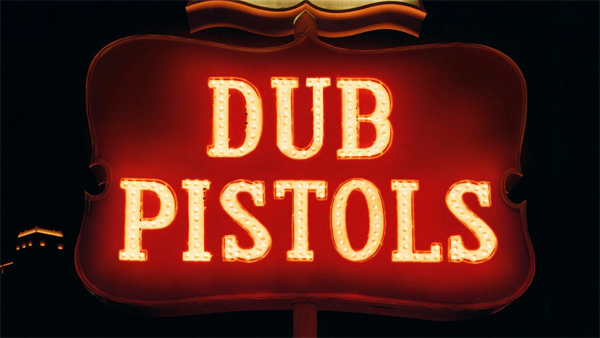
crossfadr: Did you gain anything from that experience?
BA: One good thing about the four years we spent in America was we got away from the big beat tag. Because obviously there was a big backlash to that in the UK once Fatboy Slim had blown up and we were lucky enough to fuck off to America and spend four years touring. By the time we got back to the UK everyone had forgot about the tag and we managed to get on with being a band if you like rather than being a sound.
crossfadr: Why do you think the music scene in the UK is so backlash-prone?
BA: I dunno really, fucking annoying though. Something about England, something about the British . . . In America they celebrate success; if someone’s successful they appreciate it and you go on to be more successful. In England the minute you’re successful everyone says you sold out, turns their back on you and the next thing you know, even if it’s the best record you’ve ever done, you’re a piece of shit. That’s how it is and I think we’re lucky now. We’re lucky to be the most successfully unsuccessful band ever.
crossfadr: What do you mean?
BA: The fact that we’ve never been really mainstream, that we’ve managed to sail for 15 years just under the radar, which is a good place to be, because it means you’re kind of there, you can have a career, you can sell records, and you can keep playing festivals without actually being at the top where they’re gonna smash you down to the bottom again.
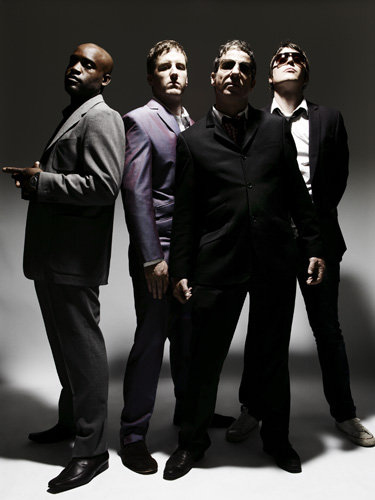
crossfadr: So you’ve got indie cred.
BA: Yeah I think we’re just lucky to be going along now, we kind of built up a solid fan-base and a decent reputation for being a good live band and we’re kind of alright. There’s not many bands that have a five album, fifteen-year career. It’s a roller coaster but we’re still here.
crossfadr: Who are some of the people you’ve collaborated with on the new album?
BA: Well we’ve worked with a lot of people, the ones that have made it are like Terry Hall, Akala who won a British MOBO for best UK pop artist, we got T.K. who’s a regular, we got Rodney P. again, Lindy Later, Darrison and MC Surreal.
crossfadr: Is there gonna be a ska vibe on the album with (former Specials singer) Terry Hall?
BA: I wouldn’t call it ska. There’s a lot of dub influences but, I mean it’s ska-ry but it’s sort of drum and bass-type ska. We’ve increased the tempo because a lot of the album is written for the way we do the live show now, and you know the faster we get the more manic the place goes. It’s kind of our electronic take on things.
crossfadr: You started out as a DJ.
BA: Yeah still am, I’m just an old DJ.
crossfadr: What made you want to go from being a DJ to being in a band?
BA: I was a singer first, I was in bands before. I’d run most of the biggest clubs in London and you know like I used to pay Chemical Brothers 50 quid for a show, I gave Underworld one of their first concerts in the UK. People like that used to come down and work for us all the time at our clubs. I remember when DJs started charging 350 pounds and I thought fucking everyone had gone mad. I thought everyone’s getting greedy now.
crossfadr: What was your band before the Pistols?
BA: It was kind of a London take on the (Happy) Mondays, but a bit more electronic.
crossfadr: Does that whole Madchester vibe inform what you do now?
BA: In 1987 I went to Ibiza and that was before the Summer of Love and I started running clubs and things and I took a load of pills and I just got off my head and that’s basically how I used to perform. I always wanted to be the highest person in the building, believing that that would project. Unfortunately it didn’t, it just meant I fell off the stage and broke me leg. But that was my belief.
crossfadr: (laughing) I read you broke your leg three times onstage?
BA: Yeah.
crossfadr: I bet even Mick Jagger or Iggy Pop can’t make that claim.
BA: (laughing) Yeah, it was just part and parcel of growing up in that era when just before the Summer of Love everyone was doing pills and I was hooked up into that, you know like I spent most of my time outta my mind.
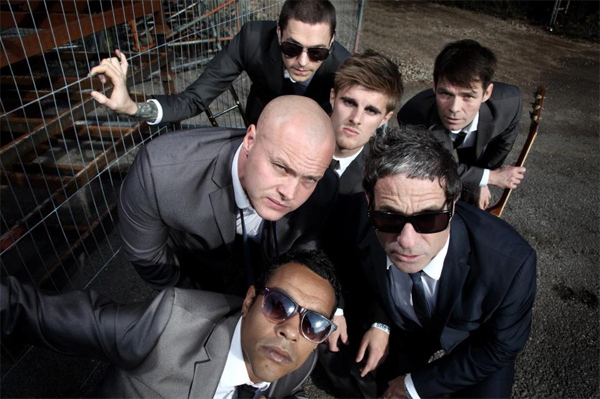
crossfadr: Would you try to get into a similar state when DJing?
BA: I used to. I’m not half as bad as I used to be. I mean now I’ll still have two bottles of vodka when I perform but I won’t be completely pilled out of my face. Just naturally, I find it harder to take those things and perform.
crossfadr: Are drugs an occupational hazard for DJs and musicians?
BA: Oh clearly. Yeah you know you’re surrounded by it, you’re young, you just start taking things and next thing you know you’re hooked up in it. And unfortunately because you get such big highs off everything then you get such big lows and that’s when your problems kick in. You know whatever goes up’s coming down, that’s life.
crossfadr: What format do you use when you DJ?
BA: CDs.
crossfadr: Really?
BA: Just because now you can’t get the releases on vinyl and I don’t like having a computer around me when I’m near turntables, because everyone’s drinking and everything seems to go everywhere, so that’s just another recipe for disaster. So for me the obvious option is CDJs. And I can’t bear DJs who look like they’re fucking reading their emails when they’re playing. I’m not into that kind of caper.
crossfadr: So you don’t dig the whole Traktor/Serato scene?
BA: I’m not anti it when it’s used properly. When people use it on the fly to do remixes and all that, I think the technology can take it somewhere else that you can’t go with turntables. But the problem is every dick now with a computer thinks he’s a DJ and that’s what I hate.
crossfadr: What do you think about DJs who are hardcore vinyl purists?
BA: I absolutely bow down to them. I mean I carried boxes of records around for years. My knees have gone, not just from falling off the stage but because I was carrying boxes of fucking records around in fields with the weight of them smashing against your legs when you use milk crates and things like that. Now, obviously with the weight restrictions on planes you can’t carry that many records. Not without it costing more than it would to take the whole band out on a show because the weight of records is just so much.
crossfadr: What was the biggest gig you ever played as a DJ?
BA: The biggest I did was a million and a half at the Love Parade (In Germany). That was insane. Unfortunately that was a couple of years ago now and that was the one where 20 odd people died, and that was when I was playing actually.
crossfadr: What happened?
BA: Everyone got crushed in the tunnel because there was a panic because they didn’t expect that many. It actually went from being the best gig that I’d ever done and the biggest high that I ever had to the biggest low in 24 hours. I remember coming off and the promoter telling me what’d happened and I was just still buzzing from playing and I was like “oh people always die at festivals.” But then the promoter was crying and once I got back to the hotel and realized what had actually happened it was just like ‘fuck this, it’s supposed to be a celebration,’ and it was just ruined me. It’s just a horrible feeling.
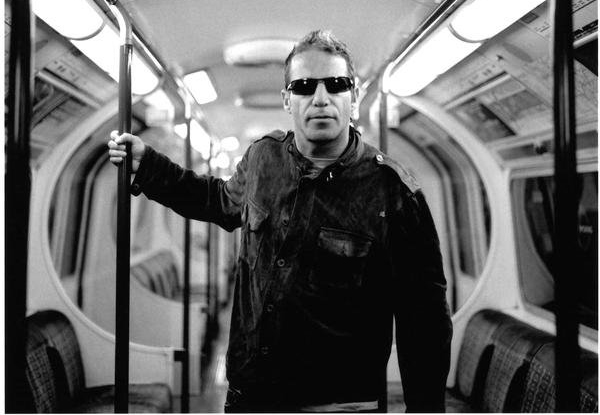
crossfadr: Dub Pistols have collaborated with some pretty major people, Gregory Isaacs, Terry Hall, Ian Brown. Who were you most in awe of?
BA: Terry Hall, he’s my god, he’s my legend. The Specials to me were special, simple as that. It was the Clash and the Specials that were my bands when I was growing up. So to actually get Terry Hall, to me he was just a legend so definitely that was the one. I was quaking in my boots when he came round because he sung it in my front room. He’s a really lovely guy.
crossfadr: You also did a remix for Ian Brown.
BA: We did a remix for Ian Brown and I’ve become, not good friends with Ian, but I’m friends with him, because Tim who plays bass with us wrote “Time Is My Everything” and plays bass for Ian. So I’ve got to know him quite well. That’s another god given talent. Not the greatest singer in the world, but his songs are fantastic, he’s godlike genius to the Brits. And obviously the Stone Roses are getting back together for another ka-ching this year.
crossfadr: That’ll be something.
BA: I was actually at Spike Island, the legendary show.
crossfadr: What do you remember of that?
BA: I remember going round their house for some reason because a mate of mine was friends with them and they used to come round to a club of mine so somehow we ended up round their house and I remember I was just in awe of how big it was. That whole thing had just suddenly happened outta nowhere like fucking hell. And then someone tried to mug me at the gig.
crossfadr: So it wasn’t all peace and love?
BA: No it wasn’t peace and love, we were in Manchester for fuck’s sake.
crossfadr: What contemporary bands or artists are you feeling?
BA: I really like Roots Maneuver, I like a lot of the new school jungle stuff that’s just starting to happen. I quite like Gentleman’s Dub Club I think they’re a really great bunch of lads and they make some really cool music. I haven’t really been into the dub step scene so I can’t say that I’m feeling that.
crossfadr: What do you make of dubstep?
BA: I was absolutely blown away by how successful it became. Of all the genres of electronic music, I thought it was the most inaccessible and yet it somehow has managed to become the biggest. It’s like the most noisy unmelodic thing ever and so when you compare it to techno or house or breaks or whatever there’s melody and there’s tunes, but dub step’s pure noise. Yet somehow it’s become mainstream. I don’t get it but fair play to them because obviously I was completely fucking wrong.
crossfadr: What DJs have influenced you?
BA: I grew up in London in a very multi-cultural society so obviously DJ David Rodigan was a big influence on me playing all the early reggae stuff. Then later on it was early Balearic beat, people like Paul Oakenfeld, Chemical Brothers, Carl Cox, Andrew Weatherall, Crystal Method.
crossfadr: Do you have plans to come to the States?
BA: I would love to say yes but to be honest we really need to pick up a new deal over there. Since the Geffen . . . it’s taken a long time, but we’re three albums down the line from that period and its mad watching all the electronic stuff that’s going on over there with the DJs that we fucking helped blaze a trail for and there’s a lot of people still going over there so I can’t say it don’t hurt that we’re not out there. The thing is I wouldn’t want a major deal in America you just want someone to put your record out and put you on a tour. So you can still make a decent living and have a decent job without having to do the full major pop fucking route. You can still do it independently.
crossfadr: You’ve had good longevity.
BA: I remember coming back shortly after the 9/11 incident and because of the deal I’d made a bit of money and I came back still thinking I had a bit of money, went to the bank one day and I was like 16,000 pounds overdrawn and I just remember shaking because I thought I had quite a lot of money in the bank but obviously I didn’t. I phoned up my manager and her answer to me was “Well you’ve had a good run Barry, haven’t you?”
crossfadr: (laughs) What did you do?
BA: I managed to phone a few people up, I was owed a few quid, so I just paid everyone off, my lawyer, all these people I was paying retainers, you know massive money, they all turned on me when they thought I was in trouble. I was just like ‘I paid you fucking lot so much money over the years. I’m in trouble for one minute and you’re fuckin’ on my back?’ I just got the money paid them all off, told em to fuck off and started again on my own.
crossfadr: What advice would you offer young DJs/bands starting out?
BA: Stay away from it; get a day job (laughs again). I dunno, I think it’s harder and harder for people out there now with the deals that are on offer. The fact that the record companies are trying to do 360 degree deals, which means they take 50% of your touring, 50% of your merchandise, 50% of everything, then your manager takes 20% your agent takes 15%, that’s not much left in the pie for the band is it? People don’t realize that when they sign their deals, that they’re actually fucked.
crossfadr: It’s true I moved to LA wanting a record deal and everyone I know who got one had their life ruined.
BA: (laughs) Do you know what I mean? The chances of you making it are so fucking far and few between it’s like, you just gotta keep going and you gotta realize why you’re doing it. It’s like you did it cause you love it and you’re doing it cause you enjoy it, if the money comes then it’s a fucking bonus.
crossfadr: Is it easier to just be a DJ?
BA: Yeah of course it means that promoters haven’t gotta pay for seven flights, they haven’t gotta pay for seven hotels, you’re not sound-checking, you just turn up fucking put your record on and away you go. With some of them its just press play and stand there waving, with a mouse head on!
Look for the Dub Pistol’s new album Worshiping the Dollar in May of this year.
http://twitter.com/dubpistols
http://www.facebook.com/dub.pistols
http://www.dubpistolsmusic.co.uk/
